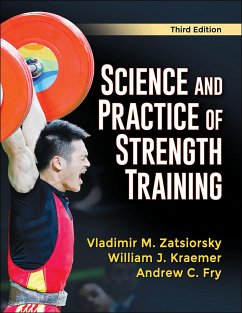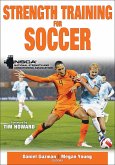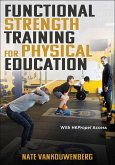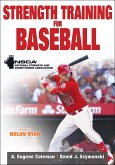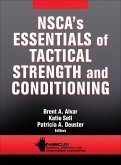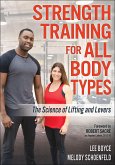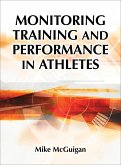- Gebundenes Buch
- Merkliste
- Auf die Merkliste
- Bewerten Bewerten
- Teilen
- Produkt teilen
- Produkterinnerung
- Produkterinnerung
Science and Practice of Strength Training addresses the complexity of strength training programs while providing advice in customizing programs for athletes and other populations. It covers velocity training, intensity, timing, exercises, injury prevention, overtraining, and athlete monitoring.
Andere Kunden interessierten sich auch für
![Science of Strength Training Science of Strength Training]() Austin CurrentScience of Strength Training17,99 €
Austin CurrentScience of Strength Training17,99 €![Strength Training for Soccer Strength Training for Soccer]() Strength Training for Soccer35,99 €
Strength Training for Soccer35,99 €![Functional Strength Training for Physical Education Functional Strength Training for Physical Education]() Nate VanKouwenbergFunctional Strength Training for Physical Education54,99 €
Nate VanKouwenbergFunctional Strength Training for Physical Education54,99 €![Strength Training for Baseball Strength Training for Baseball]() Strength Training for Baseball35,99 €
Strength Training for Baseball35,99 €![NSCA's Essentials of Tactical Strength and Conditioning NSCA's Essentials of Tactical Strength and Conditioning]() NSCA -National Strength & Conditioning AssociationNSCA's Essentials of Tactical Strength and Conditioning108,99 €
NSCA -National Strength & Conditioning AssociationNSCA's Essentials of Tactical Strength and Conditioning108,99 €![Strength Training for All Body Types Strength Training for All Body Types]() Lee BoyceStrength Training for All Body Types42,99 €
Lee BoyceStrength Training for All Body Types42,99 €![Monitoring Training and Performance in Athletes Monitoring Training and Performance in Athletes]() Mike McGuiganMonitoring Training and Performance in Athletes57,99 €
Mike McGuiganMonitoring Training and Performance in Athletes57,99 €-
-
-
Science and Practice of Strength Training addresses the complexity of strength training programs while providing advice in customizing programs for athletes and other populations. It covers velocity training, intensity, timing, exercises, injury prevention, overtraining, and athlete monitoring.
Hinweis: Dieser Artikel kann nur an eine deutsche Lieferadresse ausgeliefert werden.
Hinweis: Dieser Artikel kann nur an eine deutsche Lieferadresse ausgeliefert werden.
Produktdetails
- Produktdetails
- Verlag: Human Kinetics Publishers
- Third Edition
- Seitenzahl: 344
- Erscheinungstermin: 9. April 2020
- Englisch
- Abmessung: 289mm x 220mm x 27mm
- Gewicht: 1172g
- ISBN-13: 9781492592006
- ISBN-10: 1492592005
- Artikelnr.: 59367170
- Herstellerkennzeichnung
- Libri GmbH
- Europaallee 1
- 36244 Bad Hersfeld
- gpsr@libri.de
- Verlag: Human Kinetics Publishers
- Third Edition
- Seitenzahl: 344
- Erscheinungstermin: 9. April 2020
- Englisch
- Abmessung: 289mm x 220mm x 27mm
- Gewicht: 1172g
- ISBN-13: 9781492592006
- ISBN-10: 1492592005
- Artikelnr.: 59367170
- Herstellerkennzeichnung
- Libri GmbH
- Europaallee 1
- 36244 Bad Hersfeld
- gpsr@libri.de
Vladimir M. Zatsiorsky, PhD, is an emeritus professor of kinesiology at Penn State University. A strength and conditioning consultant for Olympic teams from the former Soviet Union for 26 years, Zatsiorsky has trained hundreds of world-class athletes. He has also authored or coauthored 15 books and more than 350 scientific papers. His books have been published in a variety of languages, including English, Russian, German, Spanish, Chinese, Japanese, Portuguese, Italian, Polish, Czech, Rumanian, Serbo-Croatian, Hungarian, and Bulgarian. He has received honorary doctoral degrees from universities in Poland and Russia and is an honorary member of the International Association of Sport Kinetics. Zatsiorsky served for 20 years on the Medical Commission of the International Olympic Committee. In his spare time, he enjoys reading, listening to classical music, and exercising. William J. Kraemer, PhD, is a full professor in the department of human sciences in the College of Education and Human Ecology at The Ohio State University. Prior to this appointment, he held full professorships at the University of Connecticut, Ball State University, and Pennsylvania State University, along with joint appointments at the medical schools of these institutions. He also has been a teacher and coach at the secondary and college levels and was a captain in the U.S. Army, working at the U.S. Army’s Research Institute of Environmental Medicine in Natick, Massachusetts. He has had extensive experience working with coaches and athletes in developing their strength training programs. Dr. Kraemer is a fellow of several organizations, including the American College of Sports Medicine (ACSM) and the National Strength and Conditioning Association (NSCA). He has served as a member of the ACSM's board of trustees and their administrative council, and he is a past president of the NSCA. He has authored and coauthored over 500 peer-reviewed manuscripts in the scientific literature. He has received numerous awards for his work and research, including the 2020 ACSM Citation Award, ACSM's Joseph B. Wolfe Memorial Lecture Award, and NSCA’s Lifetime Achievement Award. In 2016 he received an honorary doctorate from the University of Jyväskylä in Finland. He has been ranked as one of the top strength and conditioning and sport science professionals in the world. Andrew C. Fry, PhD, is a professor in the department of health, sport, and exercise sciences at the University of Kansas. After obtaining his bachelor’s degree in physical education at Nebraska Wesleyan University, he earned his master’s degree in exercise science from the University of Nebraska–Lincoln and his doctorate in exercise physiology from Penn State University. During his two-year postdoctoral training, Fry studied cellular and molecular muscle physiology at Ohio University. This was followed by 13 years at the University of Memphis, where he was the director of the Exercise Biochemistry Laboratory. At the University of Kansas, he helped develop the Research and Coaching Performance Team in collaboration with University of Kansas Athletics. His research interests over the years have consistently focused on physiological and performance responses and adaptations to resistance exercise, as well as overtraining.
Part I. Basis of Strength Training
Chapter 1. Basic Concepts of Training Theory
Adaptation as a Main Law of Training
Generalized Theories of Training
Training Effects
Summary
Chapter 2. Task-Specific Strength
Elements of Strength
Determining Factors: Comparison Across Tasks
Summary
Chapter 3. Athlete-Specific Strength
Muscle Force Potential (Peripheral) Factors
Neural (Central) Factors
Taxonomy of Strength
Summary
Part II. Concepts of Strength Training
Chapter 4. Training Intensity
Measurement Techniques
Exercising With Different Resistance
Training Intensity of Elite Athletes
Optimal Training Intensities From Comparative Research
Methods of Strength Training
Summary
Chapter 5. Timing in Strength Training
Structural Units of Training
Short-Term Planning
Medium-Term Planning (Periodization)
Periodized Programming Models
Summary
Chapter 6. Exercises Used for Strength Training
Classification
Exercise Selection for Beginning Athletes
Exercise Selection for Qualified Athletes
Additional Types of Exercises Used for Strength Training
Experimental Methods of Strength Training
Breathing During Strength Training
Summary
Chapter 7. Velocity in the Weight Room
How to Measure Velocity
Considerations When Testing
Measuring High-Velocity Lifts in the Weight Room
Slow-Velocity Concentric Resistance Exercise
Slow-Velocity Eccentric Resistance Exercise
Velocity-Related Assessments in the Weight Room
Training Method Variations and Weight Room Velocity
Using Lifting Velocity to Determine Training Load and Volume
Summary
Chapter 8. Injury Prevention
Factors Contributing to Increased Injury Risks in the Weight Room
Training Rules to Avoid Injury
Lower Back Pain and Injury
Biomechanical Properties of Intervertebral Discs
Mechanical Load Affecting the Intervertebral Discs
Injury Prevention to the Lumbar Region
Summary
Chapter 9. Overreaching, Overtraining, and Recovery
Training Monotony and Variation
Types of Resistance Exercise
Psychology of Resistance Exercise Overtraining
Speed Is Very Sensitive
Lifting Power Decrements
Vertical Jump
Rate of Force Development
Strength Decrements
So Which Performance Tests?
Physiology of Resistance Exercise Overtraining
Sequence of Performance Impairments
Summary
Chapter 10. Monitoring Athletes in the Weight Room
Purpose of Testing
Who Is the Tester?
What Is Monitored?
Practical Considerations Related to Assessment
Monitoring Tests
Analyzing and Reporting Results
Summary
Chapter 11. Goal-Specific Strength Training
Developing a Profile of Target Goals
Evidence-Based Practice
Testing and Monitoring Progress
Strength Performance
Power Performance
Muscle Mass
Endurance Performance
Injury Prevention
Summary
Part III. Strength Training for Specific Populations
Chapter 12. Strength Training for Women
Coaching Style Is Important
The Need for Strength Training for Women in Sports
Benefits and Myths of Strength Training for Women
Trainable Characteristics of Muscle
Development of Lean Tissue Mass
Physiological Contrasts Between Women and Men
Strength Training Guidelines for Women Athletes
Incidence of Injury
Menstrual Cycle and Strength Training
The Female Athlete Triad
Summary
Chapter 13. Strength Training for Young Athletes
Safety and Strength Training for Young Athletes
Types of Musculoskeletal Injuries
Primary Factors in Avoiding Injury
When to Start
Benefits of Strength Training for Young Athletes
Myths of Strength Training for Children
Strength Training Guidelines for Young Athletes
Long-Term Athletic Development
Summary
Chapter 14. Strength Training for Senior Athletes
Age and Its Effects on Strength and Power
Training for Strength Gains
Training for Muscular Power
Nutrition, Aging, and Exercise Challenges
Recovery From Resistance Exercise
Strength Training and Bone Health
Strength Training Guidelines for Senior Athletes
Summary
Chapter 1. Basic Concepts of Training Theory
Adaptation as a Main Law of Training
Generalized Theories of Training
Training Effects
Summary
Chapter 2. Task-Specific Strength
Elements of Strength
Determining Factors: Comparison Across Tasks
Summary
Chapter 3. Athlete-Specific Strength
Muscle Force Potential (Peripheral) Factors
Neural (Central) Factors
Taxonomy of Strength
Summary
Part II. Concepts of Strength Training
Chapter 4. Training Intensity
Measurement Techniques
Exercising With Different Resistance
Training Intensity of Elite Athletes
Optimal Training Intensities From Comparative Research
Methods of Strength Training
Summary
Chapter 5. Timing in Strength Training
Structural Units of Training
Short-Term Planning
Medium-Term Planning (Periodization)
Periodized Programming Models
Summary
Chapter 6. Exercises Used for Strength Training
Classification
Exercise Selection for Beginning Athletes
Exercise Selection for Qualified Athletes
Additional Types of Exercises Used for Strength Training
Experimental Methods of Strength Training
Breathing During Strength Training
Summary
Chapter 7. Velocity in the Weight Room
How to Measure Velocity
Considerations When Testing
Measuring High-Velocity Lifts in the Weight Room
Slow-Velocity Concentric Resistance Exercise
Slow-Velocity Eccentric Resistance Exercise
Velocity-Related Assessments in the Weight Room
Training Method Variations and Weight Room Velocity
Using Lifting Velocity to Determine Training Load and Volume
Summary
Chapter 8. Injury Prevention
Factors Contributing to Increased Injury Risks in the Weight Room
Training Rules to Avoid Injury
Lower Back Pain and Injury
Biomechanical Properties of Intervertebral Discs
Mechanical Load Affecting the Intervertebral Discs
Injury Prevention to the Lumbar Region
Summary
Chapter 9. Overreaching, Overtraining, and Recovery
Training Monotony and Variation
Types of Resistance Exercise
Psychology of Resistance Exercise Overtraining
Speed Is Very Sensitive
Lifting Power Decrements
Vertical Jump
Rate of Force Development
Strength Decrements
So Which Performance Tests?
Physiology of Resistance Exercise Overtraining
Sequence of Performance Impairments
Summary
Chapter 10. Monitoring Athletes in the Weight Room
Purpose of Testing
Who Is the Tester?
What Is Monitored?
Practical Considerations Related to Assessment
Monitoring Tests
Analyzing and Reporting Results
Summary
Chapter 11. Goal-Specific Strength Training
Developing a Profile of Target Goals
Evidence-Based Practice
Testing and Monitoring Progress
Strength Performance
Power Performance
Muscle Mass
Endurance Performance
Injury Prevention
Summary
Part III. Strength Training for Specific Populations
Chapter 12. Strength Training for Women
Coaching Style Is Important
The Need for Strength Training for Women in Sports
Benefits and Myths of Strength Training for Women
Trainable Characteristics of Muscle
Development of Lean Tissue Mass
Physiological Contrasts Between Women and Men
Strength Training Guidelines for Women Athletes
Incidence of Injury
Menstrual Cycle and Strength Training
The Female Athlete Triad
Summary
Chapter 13. Strength Training for Young Athletes
Safety and Strength Training for Young Athletes
Types of Musculoskeletal Injuries
Primary Factors in Avoiding Injury
When to Start
Benefits of Strength Training for Young Athletes
Myths of Strength Training for Children
Strength Training Guidelines for Young Athletes
Long-Term Athletic Development
Summary
Chapter 14. Strength Training for Senior Athletes
Age and Its Effects on Strength and Power
Training for Strength Gains
Training for Muscular Power
Nutrition, Aging, and Exercise Challenges
Recovery From Resistance Exercise
Strength Training and Bone Health
Strength Training Guidelines for Senior Athletes
Summary
Part I. Basis of Strength Training
Chapter 1. Basic Concepts of Training Theory
Adaptation as a Main Law of Training
Generalized Theories of Training
Training Effects
Summary
Chapter 2. Task-Specific Strength
Elements of Strength
Determining Factors: Comparison Across Tasks
Summary
Chapter 3. Athlete-Specific Strength
Muscle Force Potential (Peripheral) Factors
Neural (Central) Factors
Taxonomy of Strength
Summary
Part II. Concepts of Strength Training
Chapter 4. Training Intensity
Measurement Techniques
Exercising With Different Resistance
Training Intensity of Elite Athletes
Optimal Training Intensities From Comparative Research
Methods of Strength Training
Summary
Chapter 5. Timing in Strength Training
Structural Units of Training
Short-Term Planning
Medium-Term Planning (Periodization)
Periodized Programming Models
Summary
Chapter 6. Exercises Used for Strength Training
Classification
Exercise Selection for Beginning Athletes
Exercise Selection for Qualified Athletes
Additional Types of Exercises Used for Strength Training
Experimental Methods of Strength Training
Breathing During Strength Training
Summary
Chapter 7. Velocity in the Weight Room
How to Measure Velocity
Considerations When Testing
Measuring High-Velocity Lifts in the Weight Room
Slow-Velocity Concentric Resistance Exercise
Slow-Velocity Eccentric Resistance Exercise
Velocity-Related Assessments in the Weight Room
Training Method Variations and Weight Room Velocity
Using Lifting Velocity to Determine Training Load and Volume
Summary
Chapter 8. Injury Prevention
Factors Contributing to Increased Injury Risks in the Weight Room
Training Rules to Avoid Injury
Lower Back Pain and Injury
Biomechanical Properties of Intervertebral Discs
Mechanical Load Affecting the Intervertebral Discs
Injury Prevention to the Lumbar Region
Summary
Chapter 9. Overreaching, Overtraining, and Recovery
Training Monotony and Variation
Types of Resistance Exercise
Psychology of Resistance Exercise Overtraining
Speed Is Very Sensitive
Lifting Power Decrements
Vertical Jump
Rate of Force Development
Strength Decrements
So Which Performance Tests?
Physiology of Resistance Exercise Overtraining
Sequence of Performance Impairments
Summary
Chapter 10. Monitoring Athletes in the Weight Room
Purpose of Testing
Who Is the Tester?
What Is Monitored?
Practical Considerations Related to Assessment
Monitoring Tests
Analyzing and Reporting Results
Summary
Chapter 11. Goal-Specific Strength Training
Developing a Profile of Target Goals
Evidence-Based Practice
Testing and Monitoring Progress
Strength Performance
Power Performance
Muscle Mass
Endurance Performance
Injury Prevention
Summary
Part III. Strength Training for Specific Populations
Chapter 12. Strength Training for Women
Coaching Style Is Important
The Need for Strength Training for Women in Sports
Benefits and Myths of Strength Training for Women
Trainable Characteristics of Muscle
Development of Lean Tissue Mass
Physiological Contrasts Between Women and Men
Strength Training Guidelines for Women Athletes
Incidence of Injury
Menstrual Cycle and Strength Training
The Female Athlete Triad
Summary
Chapter 13. Strength Training for Young Athletes
Safety and Strength Training for Young Athletes
Types of Musculoskeletal Injuries
Primary Factors in Avoiding Injury
When to Start
Benefits of Strength Training for Young Athletes
Myths of Strength Training for Children
Strength Training Guidelines for Young Athletes
Long-Term Athletic Development
Summary
Chapter 14. Strength Training for Senior Athletes
Age and Its Effects on Strength and Power
Training for Strength Gains
Training for Muscular Power
Nutrition, Aging, and Exercise Challenges
Recovery From Resistance Exercise
Strength Training and Bone Health
Strength Training Guidelines for Senior Athletes
Summary
Chapter 1. Basic Concepts of Training Theory
Adaptation as a Main Law of Training
Generalized Theories of Training
Training Effects
Summary
Chapter 2. Task-Specific Strength
Elements of Strength
Determining Factors: Comparison Across Tasks
Summary
Chapter 3. Athlete-Specific Strength
Muscle Force Potential (Peripheral) Factors
Neural (Central) Factors
Taxonomy of Strength
Summary
Part II. Concepts of Strength Training
Chapter 4. Training Intensity
Measurement Techniques
Exercising With Different Resistance
Training Intensity of Elite Athletes
Optimal Training Intensities From Comparative Research
Methods of Strength Training
Summary
Chapter 5. Timing in Strength Training
Structural Units of Training
Short-Term Planning
Medium-Term Planning (Periodization)
Periodized Programming Models
Summary
Chapter 6. Exercises Used for Strength Training
Classification
Exercise Selection for Beginning Athletes
Exercise Selection for Qualified Athletes
Additional Types of Exercises Used for Strength Training
Experimental Methods of Strength Training
Breathing During Strength Training
Summary
Chapter 7. Velocity in the Weight Room
How to Measure Velocity
Considerations When Testing
Measuring High-Velocity Lifts in the Weight Room
Slow-Velocity Concentric Resistance Exercise
Slow-Velocity Eccentric Resistance Exercise
Velocity-Related Assessments in the Weight Room
Training Method Variations and Weight Room Velocity
Using Lifting Velocity to Determine Training Load and Volume
Summary
Chapter 8. Injury Prevention
Factors Contributing to Increased Injury Risks in the Weight Room
Training Rules to Avoid Injury
Lower Back Pain and Injury
Biomechanical Properties of Intervertebral Discs
Mechanical Load Affecting the Intervertebral Discs
Injury Prevention to the Lumbar Region
Summary
Chapter 9. Overreaching, Overtraining, and Recovery
Training Monotony and Variation
Types of Resistance Exercise
Psychology of Resistance Exercise Overtraining
Speed Is Very Sensitive
Lifting Power Decrements
Vertical Jump
Rate of Force Development
Strength Decrements
So Which Performance Tests?
Physiology of Resistance Exercise Overtraining
Sequence of Performance Impairments
Summary
Chapter 10. Monitoring Athletes in the Weight Room
Purpose of Testing
Who Is the Tester?
What Is Monitored?
Practical Considerations Related to Assessment
Monitoring Tests
Analyzing and Reporting Results
Summary
Chapter 11. Goal-Specific Strength Training
Developing a Profile of Target Goals
Evidence-Based Practice
Testing and Monitoring Progress
Strength Performance
Power Performance
Muscle Mass
Endurance Performance
Injury Prevention
Summary
Part III. Strength Training for Specific Populations
Chapter 12. Strength Training for Women
Coaching Style Is Important
The Need for Strength Training for Women in Sports
Benefits and Myths of Strength Training for Women
Trainable Characteristics of Muscle
Development of Lean Tissue Mass
Physiological Contrasts Between Women and Men
Strength Training Guidelines for Women Athletes
Incidence of Injury
Menstrual Cycle and Strength Training
The Female Athlete Triad
Summary
Chapter 13. Strength Training for Young Athletes
Safety and Strength Training for Young Athletes
Types of Musculoskeletal Injuries
Primary Factors in Avoiding Injury
When to Start
Benefits of Strength Training for Young Athletes
Myths of Strength Training for Children
Strength Training Guidelines for Young Athletes
Long-Term Athletic Development
Summary
Chapter 14. Strength Training for Senior Athletes
Age and Its Effects on Strength and Power
Training for Strength Gains
Training for Muscular Power
Nutrition, Aging, and Exercise Challenges
Recovery From Resistance Exercise
Strength Training and Bone Health
Strength Training Guidelines for Senior Athletes
Summary

